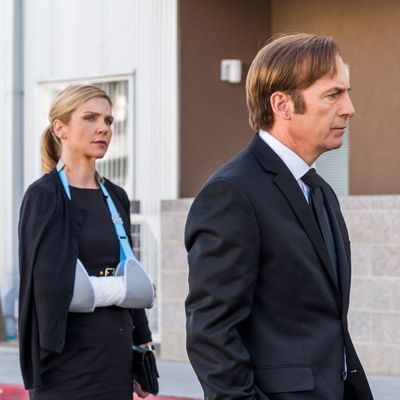
Charles Lindbergh McGill had quite a lot in common with the famous aviator who inspired his first and middle names. After all, they were both child prodigies from the midwest who achieved considerable wealth and respectability in their chosen field. The original Charles Lindbergh, however, was a noted anti-Semite. Chuck McGill, on the other hand, brought the force of his prejudices down on one man: his brother Jimmy.
That goes a ways toward explaining how Jimmy, sitting in the front pew for Chuck’s funeral, could do little more than gaze at an image of his late, lone family tie as if it were an abstraction. What to make of this man who could never focus on Jimmy as anything other than a threat to his self-imposed burden of greatness? Of a man who’d helped wedge a brotherly divide so vast that he’d likely have preferred Jimmy go unmentioned among his survivors in a newspaper obituary?
Maybe, as it turns out, that’s someone else’s cross to bear. Perhaps it’s Howard’s, given how he all but volunteers for the job amid a tearful confession about forcing Chuck out of the firm he co-founded nearly a quarter century earlier. Let him have it, Jimmy seems to figure. Let Howard inherit this curse, this life sentence of suffering under Chuck’s tyranny.
Chuck’s apparent decision to dramatically take his own life is, in one sense, the inevitable terminus of his illness, an ultimate demonstration of his incapacity to cope with what he can’t control. Granted, Jimmy’s not being true to himself or anyone else by remaining mum about his role in screwing HHM with their malpractice insurer. He is, however, breaking the hold Chuck’s had over him for decades, and making a choice to live with no lingering obligation to a man that wielded disapproval to his death.
As it happens, Jimmy’s own story doesn’t end even more ingloriously on the cold tile floor of an Omaha Cinnabon. The season-opening flash-forward (which, as I’ve written elsewhere, I’m convinced occurs in 2057) shows us Gene Takavic née Jimmy from the perspective of rubbernecking mall patrons and through Gene’s own eyes, yet another blurry, unreal POV for him to process. After a tense encounter with a terrifyingly cheery and administratively inept hospital receptionist — who among us hasn’t typed “o” rather than “0”? — Gene hops into a taxi and quickly catches the driver’s eyes staring back at him sharp as can be. An Albuquerque Isotopes air freshener dangles from the rear-view as precariously as Gene’s immediate prospects for survival. The screen goes black as Gene clutches his belongings, having rounded the nearest corner street, waiting for the sound of that cab peeling away. Next we see our mustachioed exile, he may well be prone, in the throes of a panic attack, yet again.
Back in the chaotic days of New Mexico circa 2003, Nacho’s not breathing a whole lot easier after Hector’s stroke. He can’t find a way to ditch the meds he swapped away from Gus’s prying eyes, and worse yet is brought before Juan Bolsa for a debrief. The good news is, he’s sent on his way with a higher-profile distro job and the chance to make an impression on Don Eladio. He heads to a nearby bridge and tosses the telltale pills and vial, resuming normal respiratory function. But just across the water, Victor is watching and tracking. Nacho is literally on Gus’s radar in a big way, and Gus has made clear to Bolsa that a continuing Salamanca enterprise can only bring more harm than help.
None of this is Mike’s problem — yet. He’s got it made at the moment, looking after his granddaughter and kicking back with substantial checks from his new employer, Madrigal (albeit checks with shocking deductions as part of his welcoming to the upper class), while popping into his workplace to sign birthday cards, settle inane office disputes, and throw his weight around with regional-office management. It’s not entirely clear whether Lydia will approve of his barnstorming approach to security consulting, but hopefully she’ll appreciate that he did just get out of parking-lot-attendant prison, and couldn’t even keep his company windbreaker.
Really, no one in Better Call Saul should take their eye off the ball, because “Smoke” doesn’t merely foreshadow — or in this case, contemplate the consequences of — fire. It leaves little signposts of its universe’s eventual collision with that of Breaking Bad’s throughout. An opening for a job with Beneke Fabricators, Skylar White’s employer, is visible beside those Jimmy circles; Madrigal middle man Barry Hedberg, from a distance, looks awfully Walter White–like (not to mention swap out the “db” in Hedberg for “isenb” and you get …), and that shot of his son’s repaired dirt bike certainly brings back memories; and Gus makes plain that someone someday will challenge the Salamancas and bring the wrath of the DEA. What he couldn’t have guessed is it would be someone who scans with the bookishness of Barry Hedberg. Or that neither of them would outlast the legend known as Gene Takavic.
Apart From All That
• No Lowe Memorial Hospital I could find in Omaha. At least not this decade.
• Those hospital doors opening and closing were perfectly unnerving.
• Composer Dave Porter, once again the show’s secret weapon.
• Director Minkie Spiro knows her rats.
• I’m convinced Zafiro Añejo is cursed.
• Tina: Do not reach for the stars. Look where it got Chuck.

